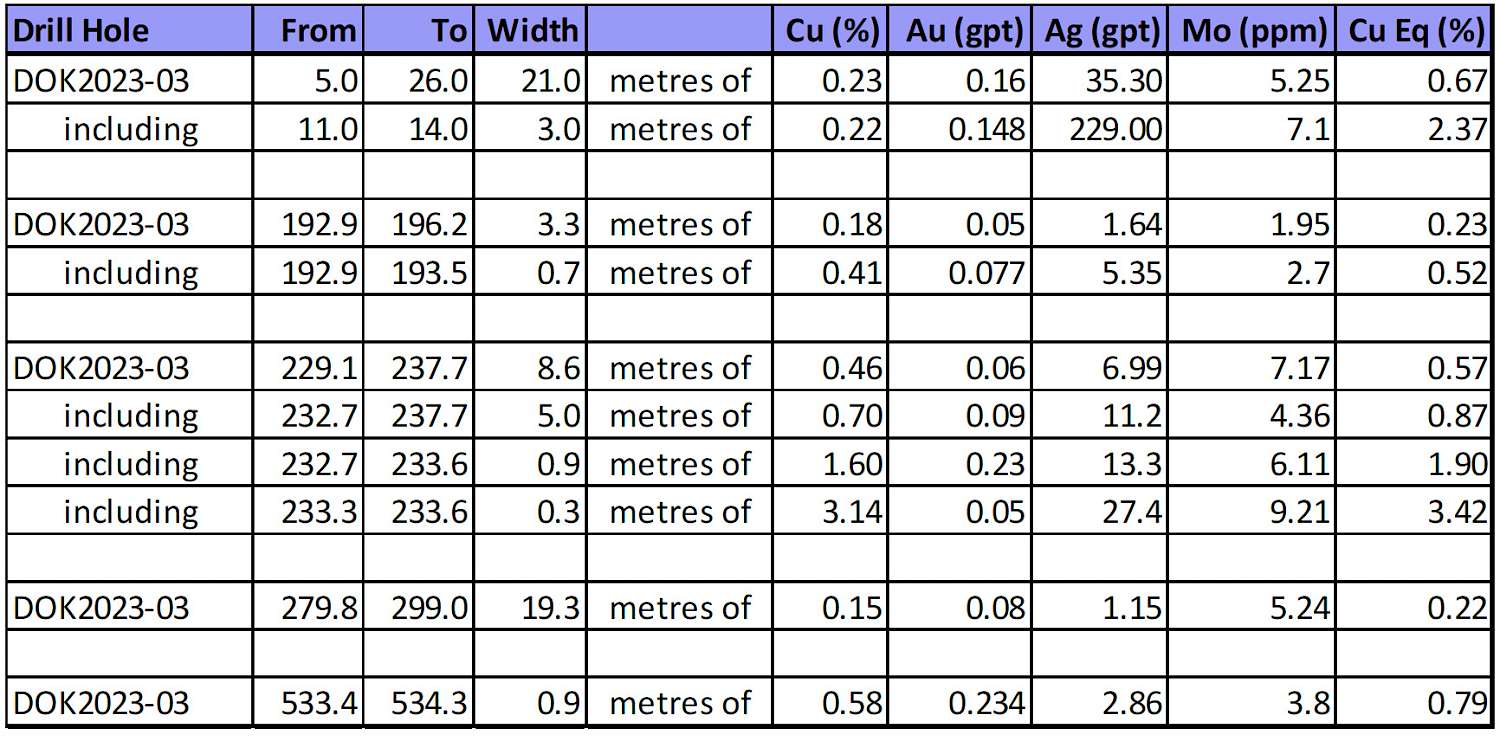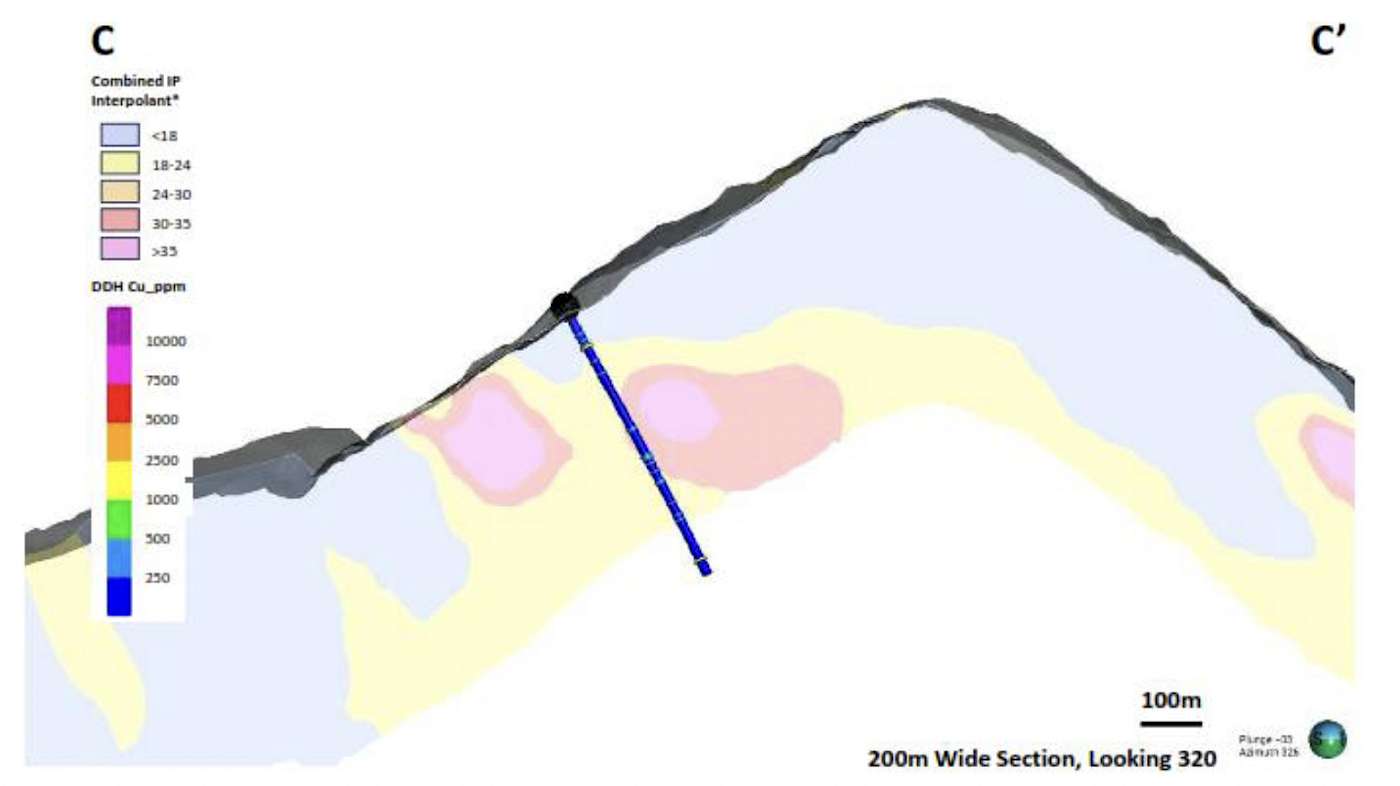- A 700-meter step out from drill hole DOK2023-01 intersects several copper-gold intervals.
- Drilling spans 3.3 kms of the open ended Dok Trend.
- 3DIP Geophysics provides guidance for next round of drilling.
Vancouver, B.C. – January 17th, 2023 - MTB Metals Corp. (“MTB” or the “Company”) (TSX.V: MTB, OTCQB: MBYMF, Frankfurt: M9U) is pleased to report assays from drill holes DOK2023-02 and DOK2023-03. These holes partially define an area of interest for 2024 drilling.
The third hole from the 2023 program successfully expanded the strike-length and width of mineralization along the Dok Trend. The hole cut several copper-gold intercepts including 21 meters of 0.68% Cu Eq and 8.6 meters of 0.57% Cu Eq. (Table 1)
Lawrence Roulston, CEO, stated: “These initial holes have confirmed the presence of a porphyry hydrothermal system spanning at least 3.3 kilometers. This is a large, complex, multi-phase system is located in the same geological setting as four other world class deposits located in the area. Significant exploration potential exists along the Dok Trend. This premise is supported by drilling, a continuous induced polarization (IP) chargeability anomaly, fertile porphyry intrusive units, and anomalous copper and gold in soil geochemistry. Continued compilation of the drilling results together with the late-season 3DIP and other geological information will provide a basis for vectoring toward the core of the system with subsequent drilling.”
DOK2023-03 targeted a moderate IP chargeability anomaly, underneath an outcrop which returned high-grade grab samples including 3.22% copper with 4.62 g/t gold. The hole was placed along the most easterly line from the 2012 IP program and the 2023 3DIP data had not been collected. Table 1 highlights the significant assays from the hole.
This hole encountered sedimentary-volcanic Stuhini host rocks, post mineral rhyolitic dykes and several variably mineralized monzonite dykes. Potassium feldspar and secondary biotite alteration is noted in several phases of the monzonite dykes. Of note are the five monzonite dykes up to 1 metre wide encountered between 230.9 and 237.7 metres. Clots of secondary coarse biotite and potassium feldspar is clearly recognizable and assays of up to 3.14 % occur within the dyke. The section hosting the dykes assayed 0.57% Cu Eq over 8.6 metres (Figures 1, 2, and 3).
Table 1 – Highlighted assay results from drill hole DOK2023-03
The copper equivalent calculation utilizes the standard equation and is based on current (January 11, 2024) spot metal prices of copper at US$3.78 per pound, gold at US$2,032 per ounce, silver at US$23.03 per ounce, and molybdenum at $19.50 per pound. Recoveries are set at 100% for all metals for purposes of the copper equivalent calculation as no metallurgical test data is available. Cu Eq is used for illustrative purposes only and does not imply that the metals are economically recoverable.
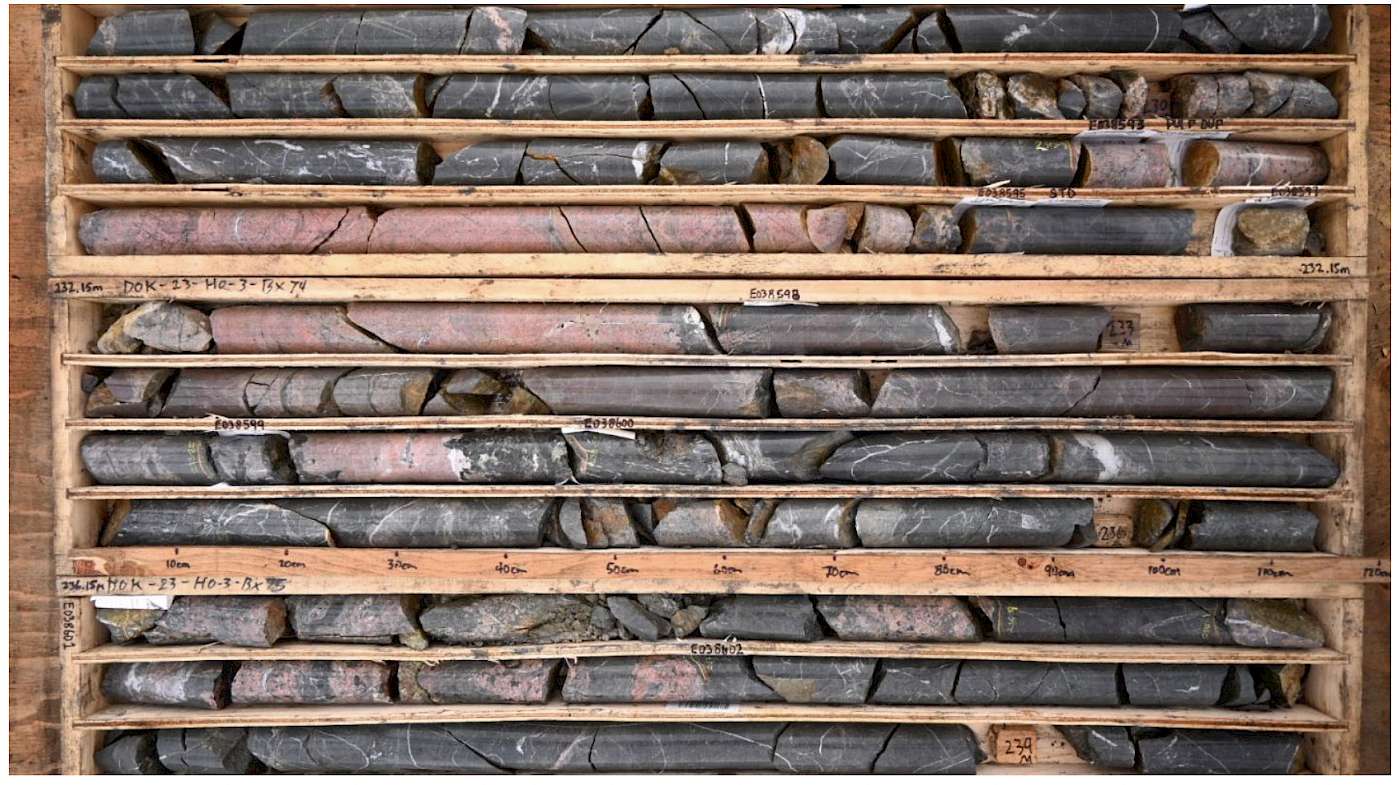
Figure 1 - DK2023-03 from 229.1 to 237.7 meters yielding 8.6 meters of 0.57 Cu Eq (%).
DOK2023-02 (Figure 2 and 4) tested the Red Creek zone, 3 km southeast of DOK2023-01 and was the first hole drilled in that area. The hole encountered low grade copper and gold mineralization from surface to 500 meters and zones of up to 30% disseminated and semi-massive pyrite mineralization. DOK2023-02 is surmised to be within the peripheral zone of a magmatic hydrothermal porphyry system, based on both vertical and lateral distribution of porphyry related trace elements; significant sericite, silica, and chlorite alteration; and multi-percent pyrite.
DOK2023-02 demonstrates that the magmatic hydrothermal footprint at Telegraph extends for several kilometers and that the Dok and Red Creek areas have the potential to host several porphyries. The drill hole mainly intersected the sedimentary-volcanic host rocks and did not intersect any fertile intrusive units, which are an important contributor to increased copper values.
Moving forward, MTB is working with the Mineral Deposit Research Unit at the University of British Columbia (MDRU) to characterize the many porphyritic intrusive phases encountered in drilling and on surface with the objective of identifying the more fertile phases of intrusions and develop a better understanding of the geology overall.
MTB contracted Dias Geophysical to conduct a 16 line-km 3D Induced Polarization (“3DIP”) ground geophysical survey which links the previously completed 2022 3DIP and the 2012 IP surveys. The three surveys are currently being integrated. Initial interpretations show a significant northwest-southeast trending chargeability anomaly (Figure 2 and 5). This anomaly is interpreted to map out the extent of the Dok Ridge sulphide-bearing hydrothermal system which extends at least 5 km. These systems host or have significant potential to host porphyry copper-gold mineralization. DK2023-01 and DK2023-03 are at the northwest end of the chargeability anomaly. The trace of the chargeability anomaly shown in figure 2 suggests the extent of untested prospective ground. Initial 2024 plans include further soil sampling along the north facing slope of Dok Ridge where several large IP chargeability anomalies occur, in particular those that overly mapped structures. Additional future work would include drilling of selected targets (Figure 5).
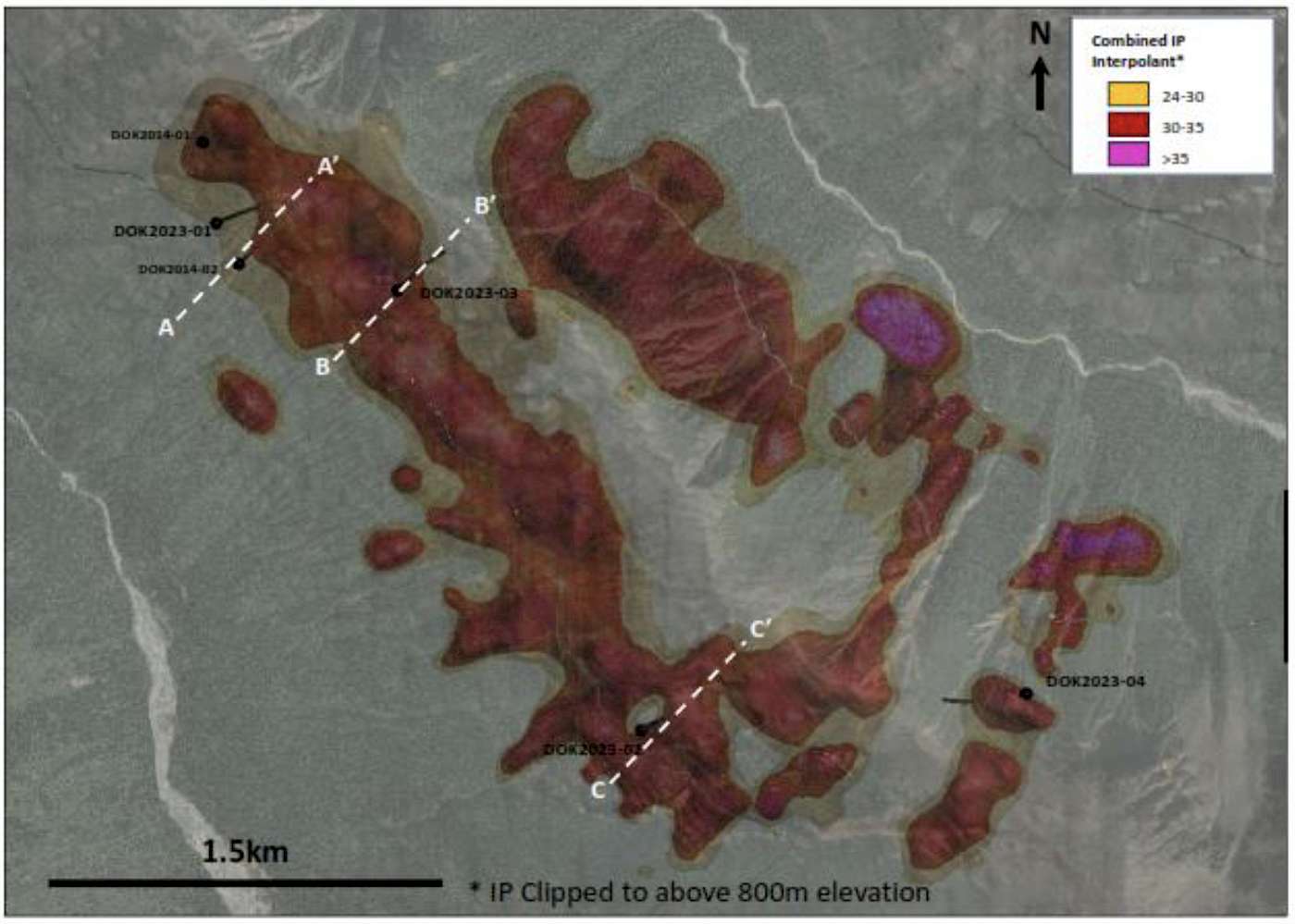
Figure 2 - Plan view of chargeability merged from the 2014, 2022 and 2023 IP surveys. The merged data has not been leveled by a geophysicist and is for illustrative purposes only. Cross sections B-B’, and C-C’ in figures 3 and 4, respectively.
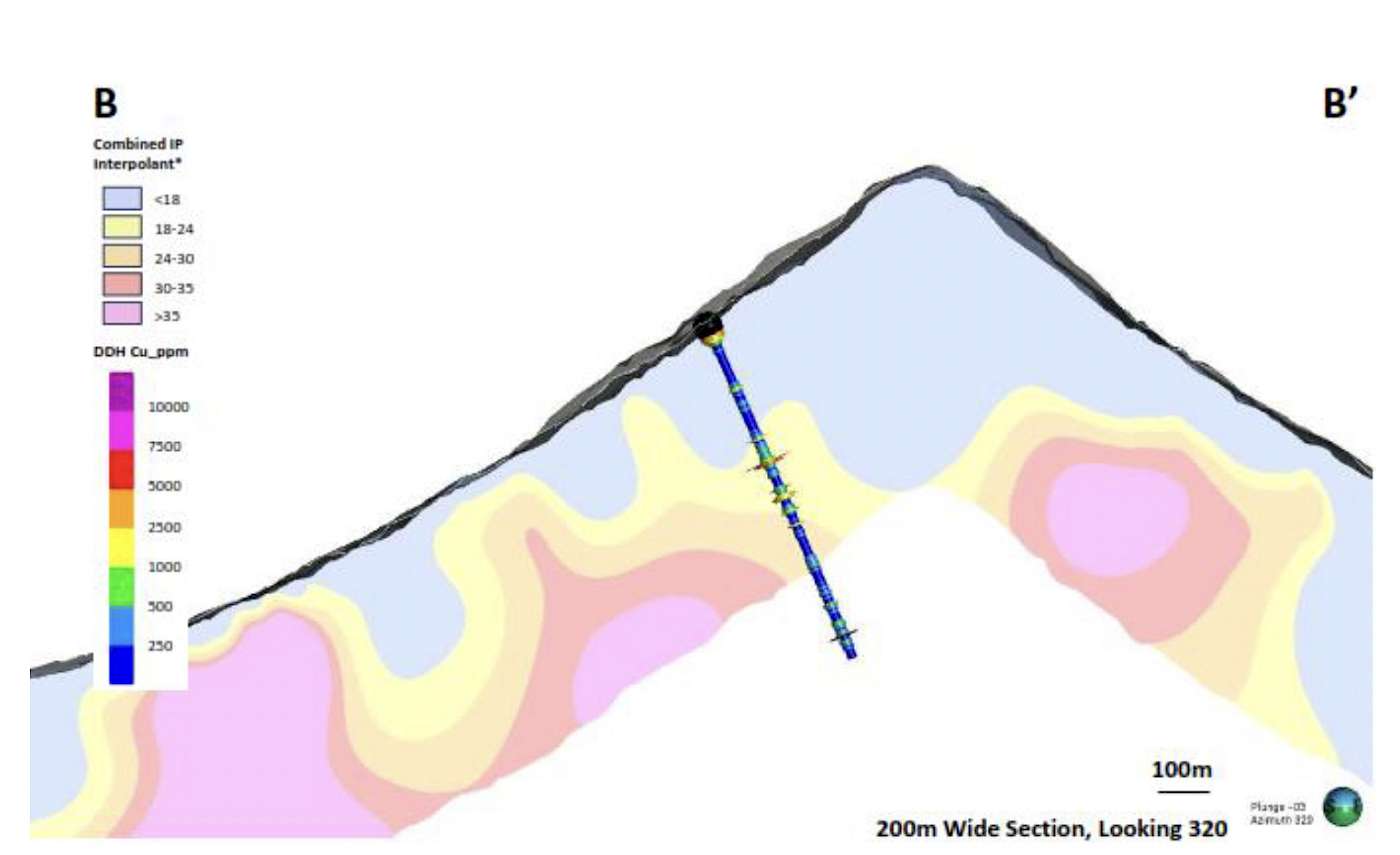
Figure 3: Cartoon Cross Section through drill hole DK-2023-003 and chargeability. The merged data is from 3 programs, conducted in 2012, 2022 and October of 2023. It has not been leveled by a geophysicist and is for illustrative purposes only.
Figure 4: Cartoon Cross Section through drill hole DK-2023-002 and chargeability. The merged data is from 3 programs, conducted in 2012, 2022 and October of 2023. It has not been leveled by a geophysicist and is for illustrative purposes only.

Figure 5: Long section through 2023 drilling with merged IP data plotted sub-surface, darker pinks representing higher chargeability.
Lucia Theny, Vice President, Exploration, noted: “Our first ever drill program at Telegraph successfully delivered results supporting our thesis that the Dok target area has significant room to grow and that there is potential for the discovery of large porphyry systems comparable to other deposits within the Golden Triangle. We look forward to continued drilling in 2024 at this underexplored porphyry district within the prolific Golden Triangle.”
Property Ownership
The Telegraph project is located within the traditional territory of the Tahltan First Nation. MTB has a 100% interest in 23,989 ha, an option to acquire a 100% interest in 2,972 ha and an option to acquire a 60% interest in 7,478 ha from ExGen Resources Inc. (Dok Option, which covers a portion of the Dok Trend). The recent drilling was conducted on the Dok Option property.
QA/QC
Analytical work for samples was completed by ALS Canada Ltd, with sample preparation and geochemical analyses in North Vancouver, BC. Core samples were fine crushed before a 250-gram split was pulverized to better than 85% passing 75 microns. Gold was determined for core samples by the PGM-ICP24 procedure which involves fire assay preparation using a 50-gram charge with an inductively coupled plasma-atomic emission spectroscopy finish (“ICP-AES”). Soil samples were dry screened at 180 microns, with analysis conducted on the fine fraction. Gold was determined for soil samples by the Au-ICP21 method, which involves fire assay preparation with a 30-gram charge followed by an ICP-AES finish. Multi-element data for 48 elements was determined for all samples by the ME-MS61 procedure, which involves a four-acid digestion followed by ICP-AES and inductively coupled plasma-mass spectrometry.
Rigorous procedures are in place regarding sample collection, chain of custody and data entry. Certified assay standards, duplicate samples and blanks are routinely inserted into the sample stream of diamond drill samples to ensure integrity of the assay process. All diamond drill samples included in this news release have passed the QA/QC procedures as described above. Core was sampled using a diamond saw, with half of each interval sent to the lab for analysis, and the other half retained.
Results referenced in this release represent highlight results only. Below detection values for gold and copper have been encountered in drilling, rock, and soil samples in these target areas.
The technical disclosure in this release has been read and approved by Andrew Wilkins, B.Sc., P.Geo., a qualified person as defined in National Instrument 43-101.
About MTB
MTB has six active projects spanning 580 square kilometres (58,000 hectares) in the prolific Golden Triangle of northern British Columbia. With the focus on the Telegraph project, discussions are now underway leading to joint ventures and/or spinouts of other projects.
- Telegraph is located in the vicinity of 4 world-class porphyry deposits being advanced by major mining companies: Galore (Teck / Newmont), Schaft (Teck), Saddle (Newmont) and the operating Red Chris copper-gold mine (Newcrest / Imperial Metals). Field work by MTB on its 344 square kilometre property, together with earlier results, provides compelling evidence for the presence of one or more porphyries, similar to others in the area.
- The American Creek project is centered on the historic Mountain Boy silver mine. The project is road accessible and 20 km from the deep-water port of Stewart. There are multiple silver, gold and copper occurrences on the property, including a 2006 drill hole that encountered 5 kgs of silver over 5 metres.
- Red Cliff is a past producing gold and copper mine in which the Company holds a 35% interest. Recent drill results include 2 meters of 26 g/t gold.
- On the BA property, 182 drill holes have outlined a substantial zone of silver-lead-zinc mineralization located 4 km from the highway. Several targets with high-grade silver potential remain to be tested. Drilling in October on the George Copper zone encountered copper mineralization, with assays pending.
- On the Theia project, work by MTB and previous explorers has outlined a silver bearing mineralized trend 500 metres long, highlighted by a 2020 grab sample that returned 39 kg per tonne silver (1,100 ounces per ton). Two other zones on the property produced copper values over 5%.
- Southmore is in the midst of some of the largest deposits in the Golden Triangle. It was explored in the 1980s through the early 1990s and was overlooked until MTB consolidated the property and carried out airborne geophysics and field work which confirmed several zones of gold and copper, with values up to 20% copper and 35 g/t gold.
On behalf of the Board of Directors:
Lawrence Roulston
President & CEO
For further information, contact:
Caroline Klukowski
caroline@mtb-metals.com
NEITHER TSX VENTURE EXCHANGE NOR ITS REGULATION SERVICES PROVIDER (AS THAT TERM IS DEFINED IN THE POLICIES OF THE TSX VENTURE EXCHANGE) ACCEPTS RESPONSIBILITY FOR THE ADEQUACY OR ACCURACY OF THIS RELEASE.
This news release may contain certain "forward looking statements". Forward-looking statements involve known and unknown risks, uncertainties, assumptions and other factors that may cause the actual results, performance or achievements of the Company to be materially different from any future results, performance or achievements expressed or implied by the forward-looking statements. Any forward-looking statement speaks only as of the date of this news release and, except as may be required by applicable securities laws, the Company disclaims any intent or obligation to update any forward-looking statement, whether as a result of new information, future events or results or otherwise.

